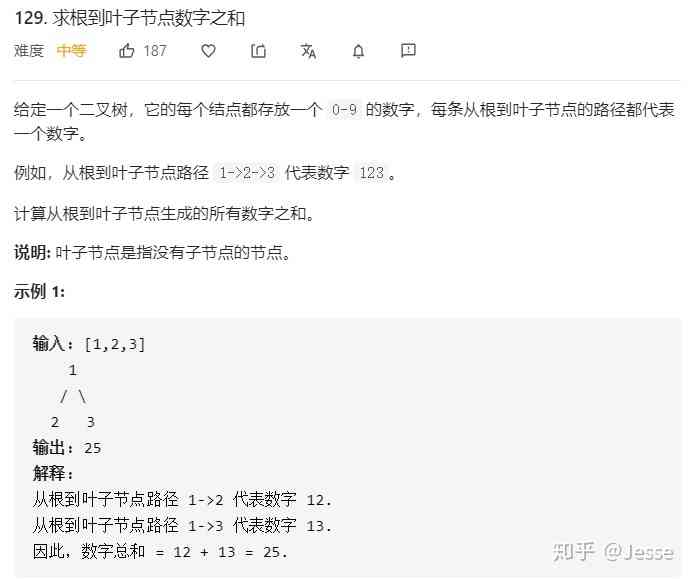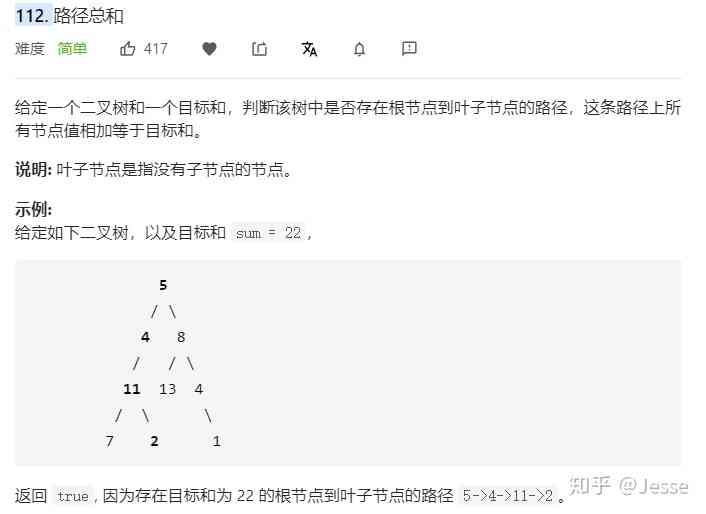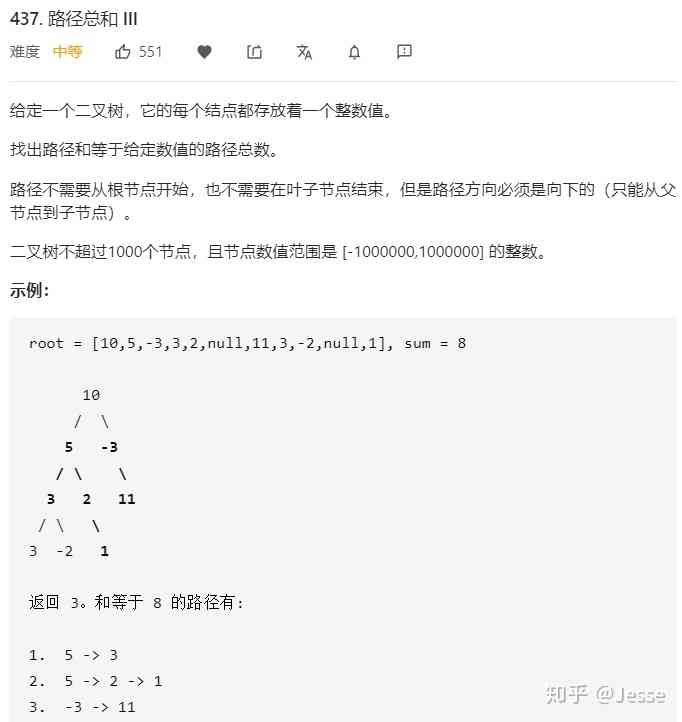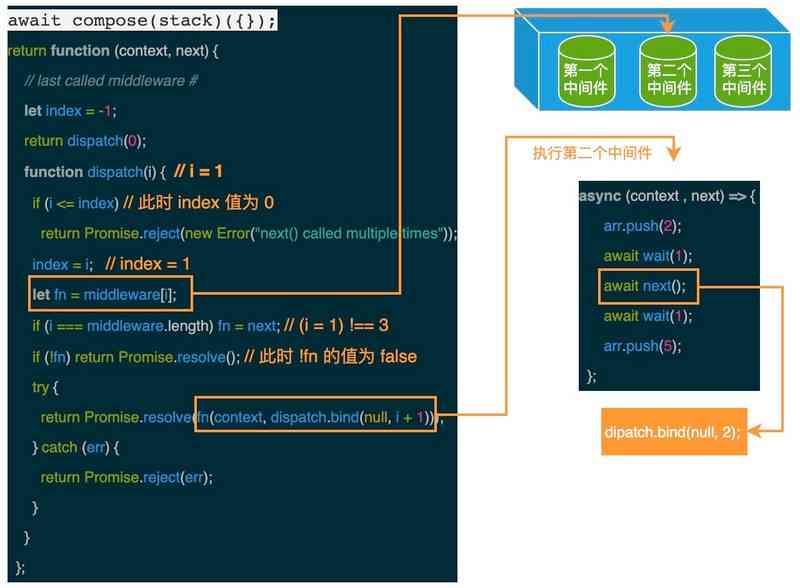This group consists of two binary trees How to find the sum of paths , Finally, make a little extension .
129. Sum Root to Leaf Numbers
Title Description : secondary

Solution 1 :dfs
Each floor needs to be multiplied by 10, Recursive implementation , consider dfs;
Use one sum To save the sum of the current path , use ans To save the sum of all current paths
Every child node ,sum = The value of the child node +sum*10 As the current path , Until you reach the leaf node ,ans = ans+sum.
1 class Solution: 2 def sumNumbers(self, root: TreeNode) -> int: 3 if not root: 4 return 0 5 def dfs(root, sum): # Recursive function , Enter the root node and sum, Output none , Constantly updated ans 6 sum = root.val + sum * 10 7 if not root.left and not root.right: 8 self.ans += sum 9 if root.left: 10 helper(root.left, sum) 11 if root.right: 12 helper(root.right, sum) 13 self.ans = 0 # You can also define a global variable , It's just relative to the inner function dfs 14 dfs(root, 0) 15 return self.ans
112. Path Sum
Title Description : Simple

Solution 1 : recursive
Traverse all nodes , Give Way sum = sum - The value of this node , Then let the child node of the node also call hasPahSum function , Until you reach the leaf node , final sum If 0, It means that such a path has been found ;
Binary tree recursion is very routine to follow , Generally speaking , When the node is done , The others will be handed back to us ;
And trees are left-right branches , So in the end, the recursive function is returned in general (left) (and/or) Recursive function (right) that will do .
1 class Solution: 2 def hasPathSum(self, root: TreeNode, sum: int) -> bool: 3 if not root: # Empty tree 4 return False 5 sum -= root.val # Every step recursion 6 if root.left == None and root.right == None: # Recursion end condition 7 return (sum == 0) 8 return self.hasPathSum(root.left, sum) or self.hasPathSum(root.right, sum) # As long as there is a path for True that will do . 9 # Time complexity : Visit each node once O(N). 10 # Spatial complexity : The worst case scenario when the tree is unbalanced is O(N). At best ( Trees are balanced ) Next is O(logN).
113. Path Sum II
Title Description : secondary

Solution 1 : recursive
This problem requires that the path must start from the root node and reach the leaf node , So the idea is simple , take dfs:
Each time you enter recursion, you must first reduce the current node value , namely sum -= root.val
Recursive termination condition , If it's a leaf node (not root.left and not root.right), And path residue and sum = 0 了 , Add the result to the result array ;
If there are left subtrees , Recursive left subtree , Right subtree is the same ;
Be careful , Array in python Variable type in , there path+[root.val] It is equivalent to creating a new object on the stack , If you use append Indicates that no new object has been created, that is, the original object has been put on the stack , So make mistakes .
1 class Solution(object): 2 def pathSum(self, root, sum): 3 """ 4 :type root: TreeNode 5 :type sum: int 6 :rtype: List[List[int]] 7 "" 8 if not root: return [] 9 ans = [] 10 path = [] 11 def dfs(root, path, sum): 12 sum -= root.val 13 if sum == 0 and not root.left and not root.right: # Just change the line of business : 14 ans.append(path + [root.val]) 15 if root.left: 16 dfs(root.left, path+ [root.val], sum) 17 if root.right: 18 dfs(root.right, path + [root.val], sum) 19 dfs(root, path, sum) # Think about the first value you pass in , You can get the termination condition 20 return ans
437. Path Sum III
Title Description : secondary

Solution 1 : recursive
This problem requires a path that does not necessarily start from the root node and does not have to reach the leaf node , Just change your mind a little bit :
First of all, every time you enter recursion, you must first reduce the current node value , namely sum -= root.val
Recursive termination condition , Because there is no need to reach the leaf node , All you need is path residue and sum = 0 了 , The number of programs is +1;
If there are left subtrees , Recursive left subtree , Right subtree is the same ;
The above recursive function is inner recursion , Its meaning is from any root node to find the path to meet the conditions , Of course, we also need an outer recursive function , Here is our main function pathSum, Its meaning is to find a path from a root node , After traversing all the root nodes as the starting point .
We need a global variable self.ans To record the results .
1 class Solution(object): 2 def __init__(self): 3 self.ans = 0 4 def pathSum(self, root, sum): 5 # recursive , Depth-first search 6 # situation 3: It doesn't have to start at the root , It doesn't have to end with the leaves 7 # First write down the number of such programs 8 # Ideas : Double recursion 9 # The outer recursion should be 113 Take a certain point as the starting point to find the path 10 # Inner recursion starts at each point . 11 # On this basis, the concrete solution can be realized . 12 def dfs(root, sum): # Outer recursion , Take a point as a starting point to find a path 13 # if not root: # The end condition 14 # return 15 sum -= root.val 16 if sum == 0: 17 self.ans += 1 18 if root.left: 19 dfs(root.left, sum) 20 if root.right: 21 dfs(root.right, sum) 22 # The main function : 23 # The main function should not be set to zero every time self.res 24 if not root: 25 return self.ans 26 dfs(root, sum) 27 self.pathSum(root.left, sum) 28 self.pathSum(root.right, sum) 29 return self.ans
Expand
It's also the sum of similar paths , If we fix the root node , Path is defined as starting from the root , You don't need to reach the leaf node , To find out the specific path in this way .
Solution 1 : recursive
This problem requires that the path must start from the root node, but not necessarily to the leaf node , The idea is still the same , Just change the termination condition of recursion :
Only the path residue and sum = 0 了 , Just add the result to the result array ;
If there are left subtrees , Recursive left subtree , Right subtree is the same ;
The difference from the previous question is , There is no need for outer recursive functions for this problem ;
1 class Solution(object): 2 def pathSum(self, root, sum): 3 """ 4 :type root: TreeNode 5 :type sum: int 6 :rtype: List[List[int]] 7 "" 8 if not root: return [] 9 ans = [] 10 path = [] 11 def dfs(root, path, sum): 12 sum -= root.val 13 if sum == 0: # Just change the line of business : 14 ans.append(path + [root.val]) 15 if root.left: 16 dfs(root.left, path+ [root.val], sum) 17 if root.right: 18 dfs(root.right, path + [root.val], sum) 19 dfs(root, path, sum) # Think about the first value you pass in , You can get the termination condition 20 return ans

![[C#.NET 拾遗补漏]11:最基础的线程知识](/img/5f/3db6e0620191da4893ad7b4e2ba064.jpg)
